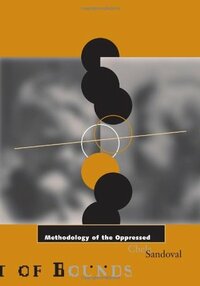Take a photo of a barcode or cover
hopeful
informative
inspiring
reflective
medium-paced
challenging
informative
slow-paced
okay i'll bite: i got here by way of queer of color critique which attributes its method (& methodology) to "third world feminism"/"women of color feminism", which present their project as the attunement of knowledge, legible as experience, to method as the creation of counter-publics or survival strategies.
"it's all identity politics, bring back real cultural studies" womp womp i'm shivering from your ice cold dialectics. i mean seriously get real.
sandoval does what many great decolonial thinkers have done before her & says "postmodernism is not the death of the subject, bound to chaotic heterogeneity, nor the correlate to modernism's solitary subject, but rather a boomerang: the fractured subject of modernism, previously only discernable at a distance through the self-recognition of the other is no longer mediated by a clear relationship between the imaginary & symbolic--we are all now fractured, and this condition finds epistemic precedence in historical experience of non-being; READ: slavery, colonialism, "a third warzone", migration, displacement."
this cashes out as Sandoval's "differential consciousness" which she compares to Anzaldua's mestizaje (ew), strategic essentialisms, & hybridity (rip lol): we are conditioned into freedom not through qualities immanent to something easily recognizable as ourselves per se, but through our capacity to negotiate the ways in which difference structures our relationships to each other.
you know it was like 2001. we had to do something with difference. it's tough reading this like 25 years later. i think we've maybe started to get a grip. power seems to be something people are talking about, which is good. Jameson was right though about radical difference: all these heterogeneous positions do not produce a moving and articulated totality through which we can ascertain historical forms of abstract domination that divide us. but who needs totalities when you have forces, genealogies, and intensities, right?? maybe it was cope all along.
this is all to say: Sandoval is perplexed by how for a brief period--say the 1960s-1980s--meaning & matter smooched for just a second, so as to raise consciousness to the point of trans-national solidarity, struggle, and insurgency. to speak romantically of the moment, as much of the literature does, is to suggest that europe was exoticized, determined not by its own abstract universalisms but by the suggestions, love, & imagination of other worlds; europe was eavesdropping. maybe it was the organic conditions of capitalist accumulation... maybe it was the category of the human... whatever it was it certainly has nothing to do with ideology or whatever the fuck Althusser was on about. Perhaps it's really indebtedness & finance capital. maybe even late liberalism, which is what we're going with now.
recently, the poet rodrigo toscano has suggested that we are in a "post-post-Colonial" moment, impressing the need to abandoned the west. to read sandoval today is to disavow any radical potential of being an "inside outsider." radical mestizaje has been thoroughly captured by empire & capital (which is not to suggest it was not always already overdetermined by its own symptoms of racial democracy anti-indigeneity & anti-blackness). if there is any durable "methodology" of the oppressed it is found not in the disciplinary "apartheid" of academia, but in Jameson's "post-literate."
regardless, we'll get 'em next time girls, i promise <3
"it's all identity politics, bring back real cultural studies" womp womp i'm shivering from your ice cold dialectics. i mean seriously get real.
sandoval does what many great decolonial thinkers have done before her & says "postmodernism is not the death of the subject, bound to chaotic heterogeneity, nor the correlate to modernism's solitary subject, but rather a boomerang: the fractured subject of modernism, previously only discernable at a distance through the self-recognition of the other is no longer mediated by a clear relationship between the imaginary & symbolic--we are all now fractured, and this condition finds epistemic precedence in historical experience of non-being; READ: slavery, colonialism, "a third warzone", migration, displacement."
this cashes out as Sandoval's "differential consciousness" which she compares to Anzaldua's mestizaje (ew), strategic essentialisms, & hybridity (rip lol): we are conditioned into freedom not through qualities immanent to something easily recognizable as ourselves per se, but through our capacity to negotiate the ways in which difference structures our relationships to each other.
you know it was like 2001. we had to do something with difference. it's tough reading this like 25 years later. i think we've maybe started to get a grip. power seems to be something people are talking about, which is good. Jameson was right though about radical difference: all these heterogeneous positions do not produce a moving and articulated totality through which we can ascertain historical forms of abstract domination that divide us. but who needs totalities when you have forces, genealogies, and intensities, right?? maybe it was cope all along.
this is all to say: Sandoval is perplexed by how for a brief period--say the 1960s-1980s--meaning & matter smooched for just a second, so as to raise consciousness to the point of trans-national solidarity, struggle, and insurgency. to speak romantically of the moment, as much of the literature does, is to suggest that europe was exoticized, determined not by its own abstract universalisms but by the suggestions, love, & imagination of other worlds; europe was eavesdropping. maybe it was the organic conditions of capitalist accumulation... maybe it was the category of the human... whatever it was it certainly has nothing to do with ideology or whatever the fuck Althusser was on about. Perhaps it's really indebtedness & finance capital. maybe even late liberalism, which is what we're going with now.
recently, the poet rodrigo toscano has suggested that we are in a "post-post-Colonial" moment, impressing the need to abandoned the west. to read sandoval today is to disavow any radical potential of being an "inside outsider." radical mestizaje has been thoroughly captured by empire & capital (which is not to suggest it was not always already overdetermined by its own symptoms of racial democracy anti-indigeneity & anti-blackness). if there is any durable "methodology" of the oppressed it is found not in the disciplinary "apartheid" of academia, but in Jameson's "post-literate."
regardless, we'll get 'em next time girls, i promise <3
challenging
informative
slow-paced
I read this book based on a recommendation from a professor who I deeply respect, and I was not disappointed. To be sure, Chela Sandoval can be a difficult (I hesitate to say "dense" because that makes density sound like a bad thing) writer. Nonetheless, I was enchanted by this book.
In The Methodology of the Oppressed, Sandoval lays out the theory and practice of the "methodology of the oppressed." This is a set of technologies and practices, guided by a "differential consciousness" and embodied in "differential social movement," and which is guided by a commitment to egalitarian social change to become a "hermeneutics of love in the postmodern world." To put it in the simplest terms I can: the methodology of the oppressed is a unique theoretical contribution developed throughout multiple forms of oppositional social movement in the late twentieth century. These movements included the third world decolonization movements of the '50s and '60s, the cultural nationalist movements of the '60s and '70s, and -crucially- U.S. Third World Feminism in the '60s, '70s, and '80s. I say crucially because it is only in and through its encounter with U.S. Third World Feminism that the methodology of the oppressed begins to fully take shape and become developed into the comprehensive theory and practice put forth by Sandoval in this book. The methodology of the oppressed consists of five key technologies: semiotics (sign-reading), deconstruction (the critical interrogation and critique of ideology), meta-ideologizing (using ideology for other purposes, one example given was "strategic essentialism"), democratics (the moral commitment to egalitarian social change), and differential consciousness (the ability to move strategically throughout and outside of ideology). These technologies are deployed in and through the differential form of oppositional social movement. This form of differential social movement is a tactical engagement with the four other modes of social movement that Sandoval identifies: equal-rights, revolutionary, supremacist, and separatist. Rather that trying to assert itself alongside these other modes, differential social movement is described by Sandoval like the gear-shift in a car. This is to say that through differential social movement, all other forms of oppositional social movement become tactics towards egalitarian social change,. No one strategy is always already favored over the others, but neither is their application haphazard. Differential social movement, guided by differential consciousness and the methodology of the oppressed, is able to strategically maneuver and transform itself in order to best challenge dominant power relations and ideologies.
The methodology of the oppressed was developed by multiple groups of subjugated peoples in opposition across time and space, but was most fully developed by US Third World Feminists in the 1960s-1980s. Sandoval believes that because of the cultural conditions brought about by neocolonizing postmodernism, all citizen-subjects can now benefit from learning and deploying the methodology or the oppressed to bring out a more just and egalitarian social order.
I will definitely have to re-read this book to understand it in its entirety. This is a powerful text, and an inspiring call-to-action for social activists of all stripes. I found the Chapter 7 and the conclusion to be extremely clarifying, so if you get bogged down midway, I can reassure you that it is most certainly worth it to keep going.
In The Methodology of the Oppressed, Sandoval lays out the theory and practice of the "methodology of the oppressed." This is a set of technologies and practices, guided by a "differential consciousness" and embodied in "differential social movement," and which is guided by a commitment to egalitarian social change to become a "hermeneutics of love in the postmodern world." To put it in the simplest terms I can: the methodology of the oppressed is a unique theoretical contribution developed throughout multiple forms of oppositional social movement in the late twentieth century. These movements included the third world decolonization movements of the '50s and '60s, the cultural nationalist movements of the '60s and '70s, and -crucially- U.S. Third World Feminism in the '60s, '70s, and '80s. I say crucially because it is only in and through its encounter with U.S. Third World Feminism that the methodology of the oppressed begins to fully take shape and become developed into the comprehensive theory and practice put forth by Sandoval in this book. The methodology of the oppressed consists of five key technologies: semiotics (sign-reading), deconstruction (the critical interrogation and critique of ideology), meta-ideologizing (using ideology for other purposes, one example given was "strategic essentialism"), democratics (the moral commitment to egalitarian social change), and differential consciousness (the ability to move strategically throughout and outside of ideology). These technologies are deployed in and through the differential form of oppositional social movement. This form of differential social movement is a tactical engagement with the four other modes of social movement that Sandoval identifies: equal-rights, revolutionary, supremacist, and separatist. Rather that trying to assert itself alongside these other modes, differential social movement is described by Sandoval like the gear-shift in a car. This is to say that through differential social movement, all other forms of oppositional social movement become tactics towards egalitarian social change,. No one strategy is always already favored over the others, but neither is their application haphazard. Differential social movement, guided by differential consciousness and the methodology of the oppressed, is able to strategically maneuver and transform itself in order to best challenge dominant power relations and ideologies.
The methodology of the oppressed was developed by multiple groups of subjugated peoples in opposition across time and space, but was most fully developed by US Third World Feminists in the 1960s-1980s. Sandoval believes that because of the cultural conditions brought about by neocolonizing postmodernism, all citizen-subjects can now benefit from learning and deploying the methodology or the oppressed to bring out a more just and egalitarian social order.
I will definitely have to re-read this book to understand it in its entirety. This is a powerful text, and an inspiring call-to-action for social activists of all stripes. I found the Chapter 7 and the conclusion to be extremely clarifying, so if you get bogged down midway, I can reassure you that it is most certainly worth it to keep going.
I haven't read an academic book in a while and this managed to be very dense without being overbearing. I read this over a weekend and really enjoyed it. Once it clicks and you get deep in the theories you never want to put this book down.
I would not recommend this book to someone who doesn't like theories.
I would not recommend this book to someone who doesn't like theories.




